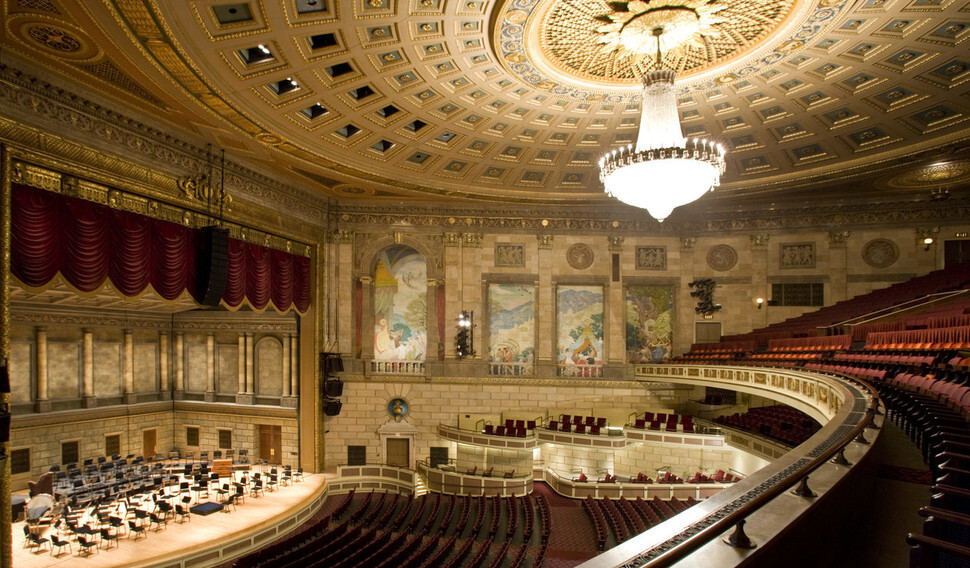hankyoreh
Links to other country sites 다른 나라 사이트 링크
Media falsely reports that China denied visas to Korean musicians for concert

Following media reports that an American university orchestra cancelled a performance in China after South Korean citizens in the orchestra were unable to get visas to China, the South Korean government learned on Oct. 31 that the Koreans in question had not even applied for Chinese visas.
The AP reported on Thursday that Jamal Rossi, dean of the Eastman School of Music, at the University of Rochester in New York, had canceled the Eastman Philharmonia’s concert in China and was delaying the tour until all the orchestra members were able to go. Several South Korean newspapers quoted this information in reports of their own.
According to these reports, the visas of the three Korean orchestra members were rejected because of a ban on South Korean performances that China had imposed following the deployment of the US’ THAAD missile defense system in South Korea in 2016.
American news media played up the visa rejection as an extension of the ongoing US-China conflict into the arenas of culture and sports. The Chinese authorities recently cancelled broadcasts of NBA matches after the owner of the Houston Rockets basketball team tweeted his support for the Hong Kong protests.
But when South Korean diplomats looked into the situation, they learned that none of the participants in the concert, including the Koreans, had applied for Chinese visas yet. In other words, it’s not true that the American orchestra members received their Chinese visas while Korean members were denied them.
One possible explanation is that the agency that the orchestra hired to handle the technical preparations for its Chinese concert may have assumed that the Koreans were unlikely to receive visas, given previous examples of China’s retaliation for the THAAD deployment.
There have been instances in which China blocked performances by Korean artists. In 2017, Korean soprano Sumi Jo had to cancel a concert in China after her visa application was rejected.
Another possibility is that the agency asked a Chinese consulate in the US about the possibility of getting visas for the Korean orchestra members and was told that the visas could not be issued. But since China’s ban on Korean cultural content was conducted on an informal basis, it’s unlikely that a consulate would have said that a visa application would be denied on record.
During a Chinese Foreign Ministry press conference on Oct. 30, Spokesperson Geng Shuang was asked about the refusal of visas to the Korean members of the Eastman Philharmonia. With the caveat that he was “not aware of the situation,” Shuang explained that “in 2018, about 9.5 million visits were made between China and the ROK [South Korea].” “If China refuses to issue visas due to the THAAD issue as some claim,” Geng continued, “how could those several million people have made it to China?”
By Park Min-hee, staff reporter
Please direct comments or questions to [english@hani.co.kr]

Editorial・opinion
![[Column] Has Korea, too, crossed the Rubicon on China? [Column] Has Korea, too, crossed the Rubicon on China?](https://flexible.img.hani.co.kr/flexible/normal/500/300/imgdb/original/2024/0419/9317135153409185.jpg) [Column] Has Korea, too, crossed the Rubicon on China?
[Column] Has Korea, too, crossed the Rubicon on China?![[Correspondent’s column] In Japan’s alliance with US, echoes of its past alliances with UK [Correspondent’s column] In Japan’s alliance with US, echoes of its past alliances with UK](https://flexible.img.hani.co.kr/flexible/normal/500/300/imgdb/original/2024/0419/2317135166563519.jpg) [Correspondent’s column] In Japan’s alliance with US, echoes of its past alliances with UK
[Correspondent’s column] In Japan’s alliance with US, echoes of its past alliances with UK- [Editorial] Does Yoon think the Korean public is wrong?
- [Editorial] As it bolsters its alliance with US, Japan must be accountable for past
- [Guest essay] Amending the Constitution is Yoon’s key to leaving office in public’s good graces
- [Editorial] 10 years on, lessons of Sewol tragedy must never be forgotten
- [Column] A death blow to Korea’s prosecutor politics
- [Correspondent’s column] The US and the end of Japanese pacifism
- [Guest essay] How Korea turned its trainee doctors into monsters
- [Guest essay] As someone who helped forge Seoul-Moscow ties, their status today troubles me
Most viewed articles
- 1[Column] The clock is ticking for Korea’s first lady
- 2After 2 months of delayed, denied medical care, Koreans worry worst may be yet to come
- 3[Column] Has Korea, too, crossed the Rubicon on China?
- 4Samsung barricades office as unionized workers strike for better conditions
- 5All eyes on Xiaomi after it pulls off EV that Apple couldn’t
- 6[Correspondent’s column] In Japan’s alliance with US, echoes of its past alliances with UK
- 7US overtakes China as Korea’s top export market, prompting trade sanction jitters
- 8Hong Se-hwa, voice for tolerance whose memoir of exile touched a chord, dies at 76
- 9[Photo] Smile ambassador, you’re on camera
- 10[Editorial] When the choice is kids or career, Korea will never overcome birth rate woes